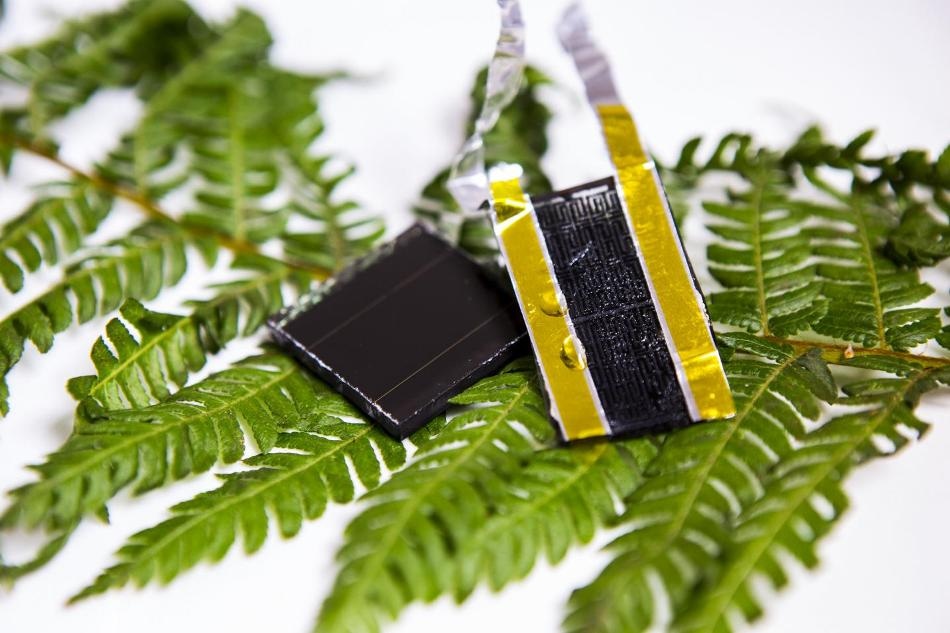Apr 3 2017
 The breakthrough electrode prototype (right) can be combined with a solar cell (left) for on-chip energy harvesting and storage. (Credit: RMIT University)
The breakthrough electrode prototype (right) can be combined with a solar cell (left) for on-chip energy harvesting and storage. (Credit: RMIT University)
An innovative prototype that could solve the storage challenge, which still holds back solar as a total energy solution, has been developed by researchers inspired by American fern.
Researchers from RMIT University have developed the new type of electrode capable of increasing the capacity of the existing integrable storage technologies by 3000 %.
A new path for the development of flexible thin film all-in-one solar capture and storage is provided by the graphene-based prototype, thus bringing individuals a step closer to self-powering laptops, buildings, cars and smartphones.
The new electrode is custom designed in a manner that allows it to work with supercapacitors, which have the potential to charge and discharge power in a much rapid manner when compared to traditional batteries. Even though supercapacitors have been combined with solar, there are still restrictions on their extensive use due to their limited capacity.
Min Gu, professor from RMIT, stated that the new design focused on nature’s own genius solution to the complexity involved in filling a space in the most effective way possible via complex self-repeating patterns called “fractals”.
The leaves of the western swordfern are densely crammed with veins, making them extremely efficient for storing energy and transporting water around the plant. Our electrode is based on these fractal shapes – which are self-replicating, like the mini structures within snowflakes – and we’ve used this naturally-efficient design to improve solar energy storage at a nano level. The immediate application is combining this electrode with supercapacitors, as our experiments have shown our prototype can radically increase their storage capacity – 30 times more than current capacity limits. Capacity-boosted supercapacitors would offer both long-term reliability and quick-burst energy release - for when someone wants to use solar energy on a cloudy day for example - making them ideal alternatives for solar power storage.
Professor Min Gu, Associate Deputy Vice-Chancellor for Research Innovation and Entrepreneurship, RMIT
The fractal-enabled laser-reduced graphene electrodes, combined with supercapacitors, are capable of holding the stored charge for a longer period, with minimal leakage. The self-repeating shape of the veins of the western swordfern, Polystichum munitum, native to western North America, is reflected by the fractal design.
Litty Thekkekara, lead author and PhD researcher, explained that the potential applications of the prototype were countless because it was based on flexible thin film technology.
The most exciting possibility is using this electrode with a solar cell, to provide a total on-chip energy harvesting and storage solution. We can do that now with existing solar cells but these are bulky and rigid. The real future lies in integrating the prototype with flexible thin film solar – technology that is still in its infancy. Flexible thin film solar could be used almost anywhere you can imagine, from building windows to car panels, smart phones to smart watches. We would no longer need batteries to charge our phones or charging stations for our hybrid cars. With this flexible electrode prototype we’ve solved the storage part of the challenge, as well as shown how they can work with solar cells without affecting performance. Now the focus needs to be on flexible solar energy, so we can work towards achieving our vision of fully solar-reliant, self-powering electronics.
Litty Thekkekara, PhD Researcher, RMIT
The research features in the 31 March issue of Scientific Reports.